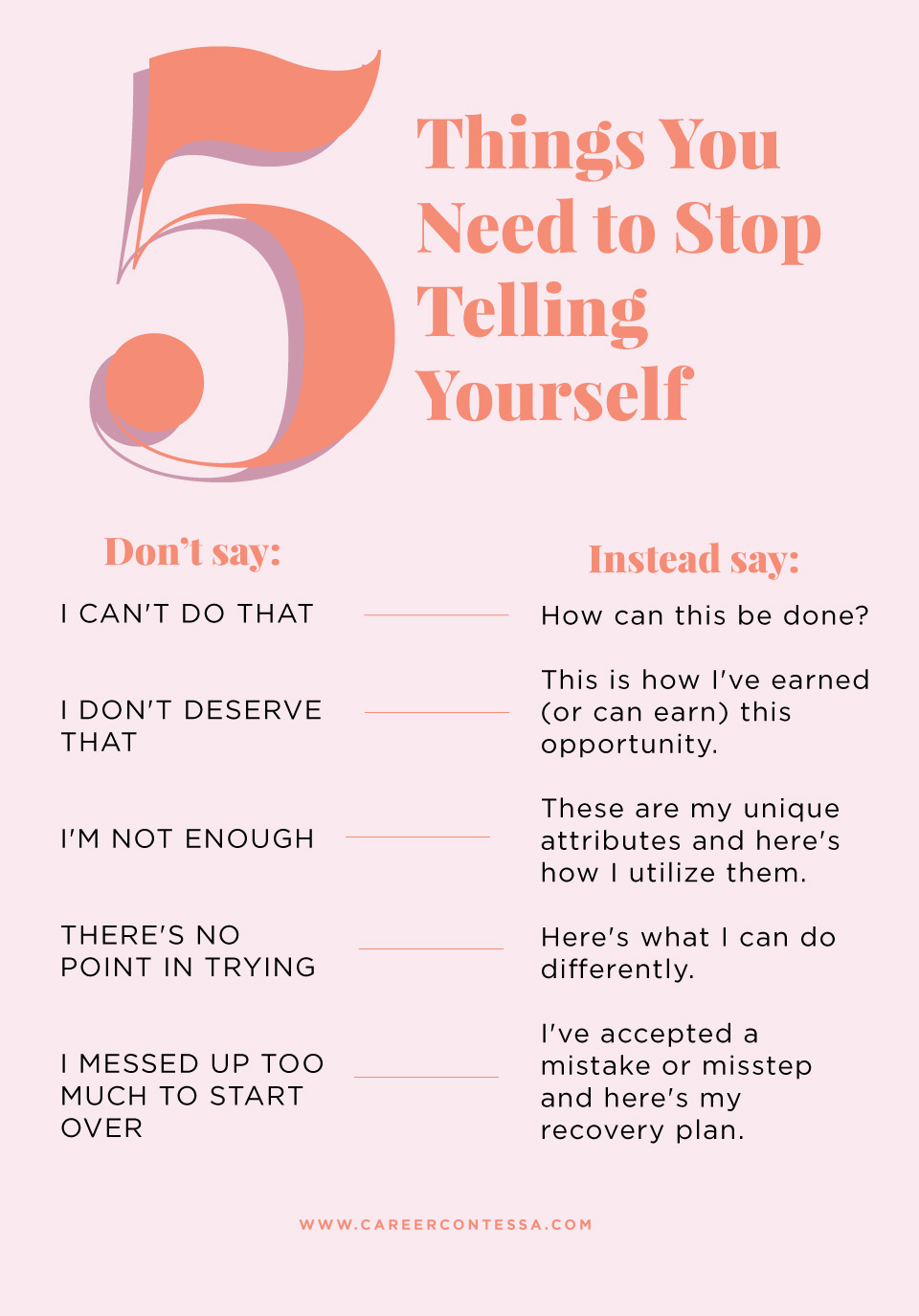"But...you're so chilled out all the time."
That's how many of us can seem on the outside. However, it's very common for people—especially women—to combat an inner voice that is constantly running a list of negative outcomes in our heads.
Let's call that inner voice Hannah—and Hannah is mean as a snake to us sometimes.
On
The Career Contessa Podcast, we spoke about recognizing and confronting our inner critics. We discussed how that negative inner voice can pop up more often when you find yourself
stuck in a comparison trap. And, often, all of this can lead to what feels like
a spiral of negative thoughts. When this happens, it's disheartening and tough. It's totally normal—this happens to
all of us—but it's still not fun when Hannah appears.
She may be there when you look in the mirror, when you
make a flub at work, when you don't fit into a pair of pants, or when you're nervously trying to approach someone in a social setting. We all like to give advice to our friends. When they're feeling down or directionless, we offer words of encouragement. We remind them about how amazing they are—how they inspire us on the regular. It feels good to make someone else feel good. At the end of the day, though, you go home, and Hannah is still there—and she refuses to stop talking negatively about you—
to you.
- What's wrong with you?
- You really couldn't make it to the gym today?
- Oh, another Netflix binge—what a cool use of time!
- When do you think we should start Botox? Yesterday?
- I thought you wanted to have kids soon.
- Are we making as much money as our friends?
- Remember when you used to run a six-minute mile? That was cool.
All of us probably have a Hannah inside. While an inner dialogue is good (hello, self-awareness!), some of the things she says are downright destructive. No one wants to constantly have an inner voice doing damage to their self-esteem or self-confidence. Here's how we can each teach our own Hannah new habits—so she can be a nicer sidekick.
1. I Can't Do That
This is maybe one of the most commonly-used types of negative self-talk. Sometimes, it's so sneaky, you don't even hear the phrase being repeated.
Especially as women, we are told from a very young age what we "can" and "cannot" do. In fact, on season two of
The Career Contessa Podcast,
we spoke with Reshma Saujani, who explains that we encourage boys to be rough and tumble. Conversely, girls are told to be quiet and to dim ourselves.
"That voice shows up in our head at about eight years old," Saujani explains.
So, it's no wonder that you become almost immune to this voice. "I can't do that," is something it's saying when you find an amazing job you want to apply for, a project you want to involve yourself in, or a panel you're invited to speak on. It may sneak up more often if you consider yourself
a perfectionist who doesn't want to risk failure.
What to say instead:
How can this be done? "I can't do that," is usually a reaction to an achievement that seems daunting at best—or impossible at worst. Anything can be done (just ask Rihanna) so put together some navigable steps on how to do it.
It
is scary to start
working toward a big goal. It might feel risky, and you may worry you'll feel like a total failure if you don't achieve exactly what you're aiming for. It bears repeating that "failures" offer opportunities for growth—and
maintaining a growth mindset is key. If you have a growth mindset, you're inherently showing yourself self-compassion (Hannah's number one nemesis). You're allowing yourself to fall down and learn valuable lessons on your way to your goal.
Figuring out an actionable plan of action for a lofty goal you'd like to achieve automatically creates a perspective shift. While you may feel some nerves or anxiety about the task at hand, you'll have a plan that will help you bravely move forward.
2. I Don't Deserve That
In this instance, we are talking about your inner voice telling you that you don't deserve good things. Maybe you received an unexpected promotion, professional acclaim, or a simple pat on the back. This is when your voice goes into hyperdrive to make sure it ruins your successes with a little sprinkle of negativity, by humming "You don't really deserve this," in your ear.
What to say instead:
This is how I've earned (or can earn) this opportunity. Of course you earned this. When you achieve something great, take some time to relish your success. Examine the steps you took to get to where you are right at this moment.
Further,
record these wins in a journal of some sort (it just takes a few minutes!) so you can refer back to them when you're focusing on your flaws or dealing with negative thinking. It's
a form of self-care that can pay off in the long run. Referring back to these examples on a regular basis may help you to ultimately quiet down that inner Hannah—and decrease that negative self-talk habit in the long run.
3. I'm Not Enough
This is what your inner voice says when you're up against a specific challenge. When this thought surfaces, it can (and often does) completely envelop us. It can lead to some rough effects of negative self-talk: feelings of self-doubt and pity.
Everyone—EVERYONE—has this specific negative thought wash over them at one point or another. It's pretty unavoidable. So let's figure out how to prove to your biggest critic that you are enough.
What to say instead:
These are my unique attributes and here's how I utilize them. If you're struggling with a recurring negative inner voice, this is a particularly damaging message. Instead of relegating yourself to these thoughts of inadequacy, take time—and we mean, regularly take time—to consider your strengths. Again, you might enact a
weekly self-evaluation in order to have a running list of what's amazing about you—and why you are definitely
more than enough.
4. There's No Point in Trying
This is what you might hear when your coworker gets a big promotion—maybe one that you had secretly hoped to get. It's a message infused with jealousy, defeat, and shame.
Instead of feeling overwhelmed by the successes happening around you, take note of them. When someone close to you—whether personally or professionally—experiences success, try not to throw your hands in the air and admit defeat. Despite what you may think, there is likely a seat for you at the table. Talk to these people experiencing windfalls of success. Find out what extra steps they took and any advice they might have to impart to you.
What to say instead:
Here's what I can do differently. Once you get the intel on what your peers did to achieve success, put your own spin on it. You'll have a more strategic plan of action for your own future—the ultimate positive spin on a tough situation.
5. I Messed Up Too Much to Start Over
You can always start over. In fact, sometimes clearing off the drawing board and starting all over again is the most refreshing thing to do. Think about the last time you fell in public. Whether you slipped on ice, tripped over a curb, or simply lost your footing, it can be a pretty embarrassing event. Sure, it puts you in this moment of intense vulnerability, but guess what? You have to get back up.
Just like a trip and a fall, a personal or professional mistake might put you on pause for a moment. After that moment, you have to get up and keep going.
What to say instead:
I've accepted a mistake or misstep and here's my recovery plan. Dust yourself off and move on. Of course, we should all learn lessons from our mistakes. However, your past mistakes do not define your future. Decide to accept any mistake, acknowledge what you learned from it, and move on to do new, great things. Thank u, next.












